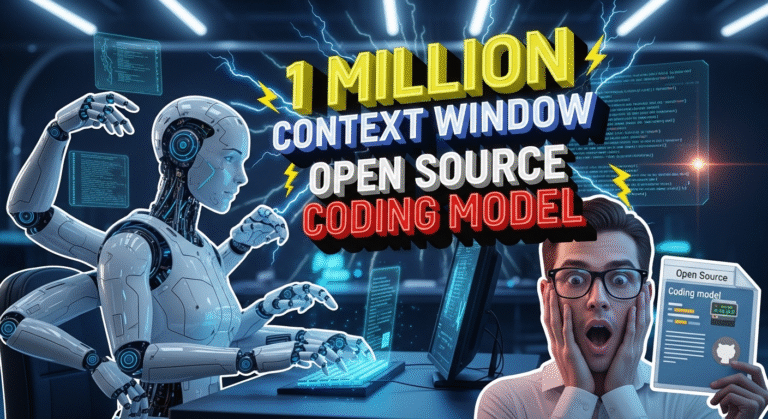Qwen Code: Revolutionary AI Coding Assistant
Alibaba’s cutting-edge large language model designed specifically for software development with unprecedented capabilities
1M Token Context Window
Native 256K tokens, expandable to 1M tokens via Yarn technology, enabling repository-scale coding capabilities and comprehensive codebase understanding.
480B Parameters MoE Architecture
Advanced Mixture-of-Experts design activates only 35B parameters during inference, striking the perfect balance between computational efficiency and superior performance.
State-of-the-Art Performance
Consistently outperforms industry benchmarks in algorithm coding, testing, and tool interaction scenarios, with capabilities rivaling Claude Sonnet in complex development tasks.
Multi-Language and Paradigm Support
Fluent in Python, JavaScript, Java, C++, Rust, and many more programming languages, with expertise across object-oriented, functional, and procedural programming paradigms.
Agentic Coding & Automation
Purpose-built for complex tool interaction including browsers and terminals, enabling sophisticated workflow orchestration through platforms like Qwen Code and CLINE.
Open-Source Alternative
Available on Hugging Face, offering full transparency and customization capabilities compared to proprietary models like Gemini 2.5, empowering developers with greater control.
The Open Source 1M Token Coder is Here: Is Qwen3-Coder the Gemini 2.5 Alternative We’ve Been Waiting For?
For months, the AI development community has watched as proprietary models like GPT-4 and Google’s Gemini series have pushed the boundaries of what’s possible, especially with massive context windows. The ability to process entire codebases or vast quantities of documentation in one go has been a tantalizing prospect, largely kept behind closed APIs. Now, that’s changing. Alibaba’s Qwen team has unleashed Qwen3-Coder-480B-A35B-Instruct, an open-source model that not only competes on raw power but brings a game-changing 1,000,000 token context window to the open community.
This release isn’t just an incremental update; it’s a direct challenge to the closed-source giants. With performance metrics that rival top-tier models and a focus on “agentic” coding, Qwen3-Coder is being positioned as a powerful, accessible, and formidable open-source alternative to models like Gemini 2.5. We’ll explore what makes this model tick, how its million-token context transforms development, and whether it truly has what it takes to democratize state-of-the-art AI for coders everywhere. 🚀
Cracking Open the Code: What is Qwen3-Coder?
At its core, Qwen3-Coder is a specialized large language model from Alibaba Cloud, meticulously designed for software development tasks. The flagship model, Qwen3-Coder-480B-A35B-Instruct, is the powerhouse of the family, but its strength comes from a very clever design rather than brute force alone. It was pre-trained on a massive 7.5 trillion tokens of data, with a heavy emphasis on high-quality code to ensure it has a deep and fluent understanding of how software is built.
This model is part of the broader Qwen3 family, which includes models of various sizes, but the 480B version is specifically optimized for cutting-edge coding tasks. Its architecture is what truly sets it apart from many other models on the market.
The MoE Advantage: Big Brain, Efficient Operation
The secret sauce behind Qwen3-Coder’s power is its Mixture of Experts (MoE) architecture. Imagine a Formula 1 team. You don’t just have one driver; you have aerodynamicists, engine specialists, and data analysts. The car’s success depends on engaging the right expert at the right time.
Qwen3-Coder works similarly. Instead of a single, monolithic 480-billion-parameter model that uses all its brainpower for every task, it’s composed of 160 smaller “expert” models. When you send it a request, the system intelligently routes the task to only 8 of these experts. This means it only uses a much more manageable 35 billion active parameters at any given moment.
This MoE design delivers two incredible benefits:
- 💡 Vast Knowledge: It gets to draw from the massive, specialized knowledge base stored across all 480 billion parameters.
- 💡 Peak Efficiency: It runs with the speed and computational efficiency of a much smaller 35B model, making it faster and less resource-intensive during operation.
The Million-Token Elephant in the Room 🐘
The standout feature attracting massive attention is the model’s enormous context window. This is the amount of information the model can “remember” and process in a single prompt. A larger context window means the AI can understand more complex problems without losing track of important details.
Here’s how Qwen3-Coder achieves its impressive capacity:
- 📌 Native Context: Out of the box, the model supports a 256,000 token context window. This is already a massive space, equivalent to hundreds of pages of text, allowing it to analyze very large files or multiple documents simultaneously.
- 📌 Extended Context: Using an advanced technique called YaRN (Yet another RoPE-based extension method), this window can be extrapolated up to an incredible 1,000,000 tokens.
From Large Files to Entire Codebases
What does a million-token context actually mean for a developer? It’s the difference between asking an assistant to read a single page versus asking them to read an entire encyclopedia. This repository-scale understanding is the key to unlocking the next level of AI-assisted development.
With this capability, a developer can:
- Analyze entire software repositories to identify architectural flaws or suggest system-wide refactors.
- Debug complex issues by feeding the model the entire chain of error logs, relevant code files, and user-reported issues all at once.
- Onboard to new projects faster by having the AI read and summarize the whole codebase and documentation.
This moves the AI from a simple line-by-line code completer to a true project-aware collaborator.
A True Open-Source Challenger to Gemini

While a direct, feature-for-feature comparison with a partially-released model like Gemini 2.5 is speculative, we can compare Qwen3-Coder to the known capabilities of the Gemini family and other top-tier models. This is where Qwen3-Coder establishes itself as a serious contender.
Comparing the AI Titans
| Feature | Qwen3-Coder-480B | Gemini 1.5 Pro | Llama 3 70B Instruct |
|---|---|---|---|
| Model Access | Open Source | Proprietary | Open Source |
| Architecture | Mixture of Experts (MoE) | Dense/MoE | Dense |
| Parameters | 480B (35B Active) | Not Publicly Stated | 70B |
| Max Context Window | 1,000,000 tokens | 1,000,000+ tokens | 8,192 tokens |
| Core Focus | Agentic Coding | Multimodality, General Reasoning | General Purpose, Efficiency |
The critical takeaway here is the democratization of the million-token context window. While Google’s Gemini 1.5 Pro was the first to announce this capability, Qwen3-Coder is among the first to deliver it to the open-source community. This allows for unrestricted research, fine-tuning, and integration without being tied to a specific corporate API or ecosystem. It empowers anyone with the right hardware to build tools that were previously only possible for a select few.
Beyond Writing Code: The “Agentic” AI Teammate
Perhaps even more important than its sheer size is the fact that Qwen3-Coder is engineered to be an agentic model. This means it’s designed to act, not just write. It functions like an autonomous teammate rather than a passive tool that waits for precise instructions.
What Does Agentic Mean for Developers?
An agentic AI can take a high-level goal and work towards it independently. For Qwen3-Coder, this means it can:
- ➡️ Use Tools: Seamlessly interact with your development environment, including command-line interfaces, linters, compilers, and external APIs.
- ➡️ Plan and Execute: Break down a complex request like, “Refactor this module to be more efficient,” into a series of concrete steps, such as reading files, writing new code, and running tests.
- ➡️ Self-Correct: Analyze the output of its actions—like error messages from a compiler or failing test results—and adjust its plan to fix the problem, just like a human developer would.
To facilitate this, the Qwen team also open-sourced Qwen Code, a powerful command-line tool. This lets developers work with Qwen3-Coder directly in their terminal, instructing it to perform complex, multi-file tasks across their entire codebase.
Getting Your Hands on Qwen3-Coder
Alibaba has made this powerful model accessible through several channels, catering to different needs and technical capabilities.
A Tool for Every Scale
- ✅ Hugging Face: For those with the hardware, the model weights are available for download under a permissive Apache 2.0 license. This allows for full local deployment and fine-tuning. You can find everything you need on the Qwen3-Coder-480B-A35B-Instruct model page.
- ✅ API Access: For easier integration, developers can access the model via Alibaba Cloud’s API, which typically offers a free tier to help you get started without a huge upfront investment in infrastructure.
- ✅ Command-Line Tool: The
qwen-codetool is available on GitHub for any developer who wants to leverage the model’s agentic power directly in their day-to-day workflow.
A word of caution: running the 480B model locally is a serious undertaking. It requires a significant amount of VRAM (think multiple high-end server GPUs), putting it out of reach for most consumer-grade machines. However, the availability of smaller Qwen3-Coder versions and API access ensures its power is not locked away.
A New Chapter for Open-Source AI

Qwen3-Coder is a landmark release. It successfully closes the gap on one of the most significant advantages held by proprietary models: the massive context window. By providing a 1-million-token, agentic coding model to the open-source community, Alibaba Cloud has not only offered a powerful alternative to systems like Gemini but has also equipped developers and researchers with the tools to build the next generation of software engineering assistants.
The message is clear: the future of elite AI is not just happening behind the closed doors of a few tech giants. It’s being built, shared, and improved upon in the open for everyone. Qwen3-Coder has set a new standard, and the entire AI ecosystem will be better for it.







